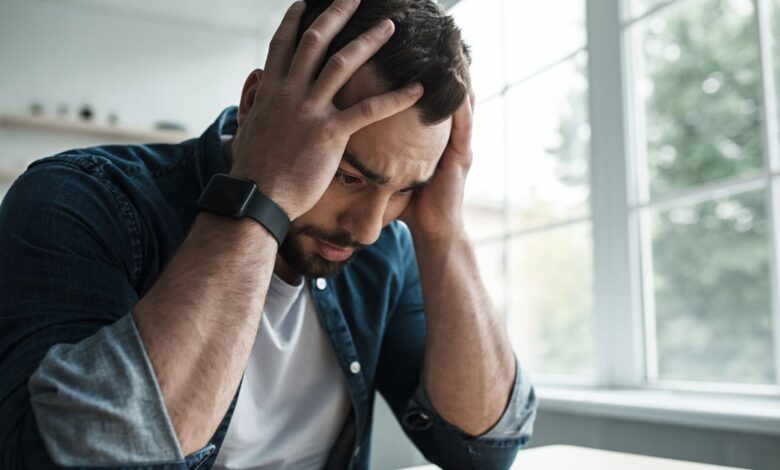Navigating Anxiety: Causes And Symptoms And Treatment Options

Navigating Anxiety: Causes And Symptoms And Treatment Options
Anxiety is a normal part of life, but it can become overwhelming for some. It’s important to understand the causes and symptoms of anxiety so you can recognize it in yourself or someone else, as well as know what treatment options are available. In this article, we’ll take an in-depth look at understanding anxiety – from its causes and symptoms to the various approaches to treating it.
When faced with stressful situations such as work deadlines or personal issues, many people experience feelings of worry or fear that can lead to physical sensations like tightness in their chest or increased heart rate. These are all common signs of anxiety, something that everyone experiences on occasion. However, when these feelings become chronic and interfere with everyday tasks, they may be indicative of an anxiety disorder.
There are numerous treatments available for those suffering from anxiety disorders ranging from lifestyle changes to psychotherapy and medication if needed. Learning more about how your body responds to stressors and triggers can help you manage your own emotions better and make informed decisions when seeking professional help. By exploring the different aspects of understanding anxiety through this article, you will gain valuable insight into managing your own mental well-being. This can help you to develop healthy coping mechanisms and better communication skills that will benefit you in the long run.
What is Anxiety?
Anxiety is a common mental health issue affecting more than 40 million adults in the United States alone. It can be caused by genetics, environmental factors, or even trauma. People may experience physical symptoms such as headaches and chest pains, which can lead to difficulty sleeping and irritability. Learning about understanding anxiety causes and its treatment options can help those struggling with it take back control of their lives.
There are many different signs that someone may have an anxiety disorder – from sudden mood swings to feelings of dread or panic attacks. While some people feel overwhelmed when faced with a stressful situation, others may find themselves avoiding certain activities altogether due to fear or worry. Additionally, feeling on edge or constantly worrying can be indicative of having this disorder too.
It’s important for those dealing with anxiety to understand how it manifests itself so they can better manage its effects. Simple lifestyle changes like exercise, journaling, mindfulness practices, and talking to friends and family can often make a big difference in managing one’s symptoms and reducing stress levels overall. Professional therapy or medication may also be necessary depending on the severity of the condition.
With the right support system in place, individuals living with anxiety can begin taking steps toward regaining control over their lives. Acknowledging what triggers them and learning coping mechanisms will go a long way in helping alleviate uncomfortable sensations associated with anxiousness— allowing them to move forward confidently into the future. Moving on to understanding the symptoms of anxiety is essential for everyone wanting to gain greater control over their mental well-being.
Understanding The Symptoms Of Anxiety
Anxiety is an incredibly powerful emotion, so intense that it can take over our lives and have us dreading it every day. It’s a feeling like no other – one of pure terror and despair. Knowing the symptoms of anxiety is essential in order to be able to confront it head-on and find treatment options that work for you.
The most common symptom associated with anxiety is excessive worrying. People who experience frequent bouts of worry will often find themselves ruminating on their thoughts until they become overwhelmed. This type of worrying could potentially lead to physical exhaustion due to the amount of mental effort put into thinking about situations or events that may never even occur. Other physical symptoms such as sweaty palms, nausea, dizziness, chest pain, rapid heartbeat, muscle tension, and difficulty breathing are also signs that someone might be dealing with an underlying level of anxiety.
Anxiety can also manifest itself through behavioral patterns such as avoiding certain places or activities out of fear or avoidance behaviors like procrastination due to low self-confidence. Many times those struggling with anxiety feel unable to control their own actions when faced with stressful situations leading them to lash out at others or isolate themselves from social settings altogether.
Understanding how emotions affect behavior can help provide insight into managing symptoms related to anxiety. Identifying what triggers each individual’s anxious response is key in finding ways to cope better when confronted with difficult scenarios. With proper guidance and support from healthcare professionals individuals can develop healthy strategies for handling stressors before they reach debilitating levels allowing them greater autonomy in navigating life’s challenges without relying on unhealthy coping mechanisms often used by those struggling with anxiety disorders. That said, understanding the causes behind anxious feelings is the next step towards learning how best to manage them successfully going forward.
Common Causes Of Anxiety
Anxiety is an incredibly common condition that can be triggered by a variety of sources in our lives. A recent study found that 80% of people with anxiety reported at least one major life stressor to have caused it, while 20% identified genetic factors as the primary source. It’s clear that there are many potential causes for this potentially debilitating mental health issue.
I recently had the opportunity to speak with Linda who shared her experience dealing with anxiety. She described feeling overwhelmed and scared when she was faced with taking on more responsibilities at work. Her chest would tighten up and she’d struggle to concentrate or even take deep breaths. After some time off from her job, Linda realized that her workload was the root cause of her issues and took steps to reduce it so she could find balance again.
It isn’t just major events like career changes or financial troubles that can trigger anxiety; everyday occurrences such as arguments with friends or family members and even seemingly small tasks like grocery shopping can become overwhelming if you’re already struggling mentally. Additionally, we know now that genetics play a role too – research has revealed specific genes linked to higher levels of anxiety disorders among certain populations.
Ultimately, understanding the underlying causes behind your anxious feelings can help you gain control over them and start taking proactive steps towards managing them effectively – whatever the source may be! From daily lifestyle choices to hereditary components, knowing what triggers your own particular pattern of anxiety is key to finding ways to address it. The next step: exploring how genetics plays a part in anxiety symptoms, diagnosis, and treatment options available today.
The Role Of Genetics In Anxiety
When it comes to anxiety, genetics can play a powerful role. A person’s family history of mental illness and other familial factors such as parenting styles or stressful life events contribute to their risk for developing anxiety disorders. For example, studies have shown that if one identical twin has an anxiety disorder, the other is more likely than average to also be diagnosed with some type of anxiety-related condition. Additionally, genes may affect how people respond emotionally to stress and how quickly they recover from traumatic experiences.
It’s important to note that while genetics are linked to anxiety, they don’t necessarily determine outcomes. Studies suggest that environmental factors such as trauma can trigger genetic susceptibilities in individuals who are predisposed to certain types of mental health issues. That being said, it’s essential for those struggling with anxiety – whether due to genetics or not – to seek professional help in order to properly manage symptoms and gain control over their lives once again.
Understanding the role that genetics plays in anxiety helps us recognize when someone might need support and guidance during difficult times. It also serves as a reminder that there are many different paths toward recovery; no two treatment plans will look the same even within the same family unit. With this knowledge in hand, we’re better equipped to recognize signs of distress in others and point them toward appropriate resources.
How To Recognize Anxiety In Others
Anxiety is a common yet debilitating mental health disorder that can leave people feeling overwhelmed and alone. Anachronistically speaking, it’s like being stuck between two doors with no way out. As such, recognizing anxiety in others is an essential step to helping them find the help they need.
The signs of anxiety vary from person to person, but there are some general indicators that may point toward this condition. Physical symptoms include stomachaches, headaches, difficulty breathing, or chest pains; while psychological signs could be feelings of restlessness, fearfulness, and irritability. People who experience these effects may also become withdrawn and avoid social situations due to their anxious thoughts and feelings.
It’s important to remember that everyone experiences different levels of anxiety throughout life – what one individual considers normal might not be appropriate for another. If someone displays several of the aforementioned physical or emotional symptoms on a regular basis, they should consider seeking professional advice as soon as possible. Professional support can make all the difference in addressing underlying causes and finding healthy coping strategies which will benefit them in the long term.
By learning how to recognize anxiety in those around us we can show support and provide guidance so that they don’t feel isolated or scared by their own emotions. This understanding is key if we’re to foster an open dialogue about mental health issues and ensure nobody has to suffer through their anxieties alone. Moving forward, it’s now time to explore the impact of anxiety on overall mental health…
The Impact Of Anxiety On Mental Health
Anxiety can have a profound impact on mental health. It can affect our ability to think clearly, concentrate, and make decisions in a healthy way. But it doesn’t stop there: anxiety can also lead to feelings of depression or hopelessness. In extreme cases, it might even manifest as suicidal ideation. While the effects of anxiety are often hard to recognize at first glance, they can quickly snowball into bigger problems if left unchecked.
Anxiety is particularly problematic because its symptoms often exacerbate each other; for instance, when someone experiences high levels of stress and fear, this could trigger physical symptoms such as chest pain or difficulty breathing that further contribute to their overall distress. Even more concerning is how these anxious thoughts and behaviors can become so ingrained that they’re difficult to shake off without outside help. Understanding why we feel anxious is key if we want to learn how best to manage it and improve our mental well-being in the long run.
How To Manage Anxiety
Anxiety can be like a heavy fog that feels oppressive and hard to shake off; it obscures our view of the world, making it difficult to move forward in life. Managing anxiety is an important step for anyone who has experienced its effects on mental health. It’s essential to recognize symptoms early and intervene with effective strategies before the issue spirals out of control.
The first step towards managing anxiety is understanding how it affects us as individuals. Each person experiences anxiety differently, so there are no one-size-fits-all solutions. Knowing what triggers bring about anxious feelings and being aware of signs such as racing thoughts or difficulty concentrating helps create awareness around when we may need extra support.
It’s also beneficial to try different coping techniques that work best in challenging moments. Deep breathing exercises, mindfulness meditation, or engaging in physical activities can all provide relief during times of heightened distress. Additionally, connecting with friends or family members can provide much-needed emotional support and help someone reorient themselves back into their routine when they feel overwhelmed by anxiety.
With these tools at hand, we can start to take steps toward regaining control over our emotions and living more fully despite feeling anxious from time to time. By becoming mindful of our own needs and finding ways to cope with stressful situations, we empower ourselves to tackle any challenges ahead without letting them consume us wholeheartedly. With this newfound strength comes the opportunity for positive change which leads the way toward greater wellness overall. Let’s continue on this journey together as we explore self-help strategies for anxiety next!
Self-Help Strategies For Anxiety
Self-help strategies for anxiety can be an effective way to manage the condition. There are many techniques you can use on your own that do not require professional help and may provide relief from stress and worry. One popular approach is cognitive behavioral therapy, which involves recognizing negative thought patterns and replacing them with positive ones. This type of therapy also helps people learn how to better manage their emotions and cope with stressful situations. Another strategy is relaxation exercises such as deep breathing or progressive muscle relaxation. Both of these activities can help reduce tension levels and promote a sense of calmness.
In addition to specific therapies, lifestyle changes like exercising regularly, eating healthy foods, getting enough sleep, avoiding substance abuse, and engaging in enjoyable activities can all contribute to lessening symptoms of anxiety. Taking breaks throughout the day for self-care is important too – something as simple as taking a few minutes away from work or other obligations to practice mindful meditation or go for a walk outside can make a difference in how you’re feeling overall.
TIP: Make sure to check out online mental health resources if you don’t have access to traditional counseling services – there are plenty of helpful videos and articles available that offer tips on managing anxiety without having to leave home! Transitioning into healthier habits will likely take some time but it’s worth putting effort into making small daily changes that could ultimately lead to significant improvements in well-being.
Therapy For Anxiety
The thought of therapy for anxiety can seem intimidating, but it is an incredibly beneficial option. It’s a chance to work with an expert who will help you learn strategies and skills that could be life-changing when dealing with your anxiety symptoms. As you talk through experiences, thoughts, and feelings in therapy, dramatic shifts can happen as insight and understanding grow.
The imagery of the process might include creating a pathway forward from stuck points toward more peaceful states of being. Taking small steps at first, gaining confidence as each step is taken until eventually feeling safe enough to take larger strides. With guidance from a therapist, anxiety may feel less overwhelming than before – enabling movement away from fear and panic into calmer waters.
Therapy provides an opportunity to practice new ways of thinking and responding that open up possibilities previously unseen or too daunting to explore on one’s own. Ultimately this kind of support reduces isolation while providing tools needed for managing difficult emotions in healthier ways. And although progress isn’t always linear or easy, there is hope that healing can occur over time—and becoming free from debilitating levels of anxiety is possible!
Medications For Anxiety
Medications for anxiety can be a powerful tool in alleviating symptoms of the disorder. Like a key unlocking a door, it may open up pathways to relaxation and peace of mind. Here are some notable medications commonly prescribed:
- SSRIs (selective serotonin reuptake inhibitors): These drugs increase levels of serotonin, which is believed to improve moods and regulate emotions
- SNRIs (serotonin-norepinephrine reuptake inhibitors): This medication also works on two neurotransmitters – serotonin and norepinephrine – to create balance in brain chemistry
- Tricyclic antidepressants: A more traditional type of antidepressant that helps reduce pain signals in the brain
- Benzodiazepines: Used mainly for short-term treatment due to their potential for addiction or misuse; however, they can provide temporary relief from severe anxiousness.
The right combination of therapy and medication can help make life with anxiety manageable. With proper guidance, individuals living with anxiety can learn how to cope better with their condition while exploring alternative treatments that might work best for them.
Alternative Treatments For Anxiety
Alternative treatments for anxiety are becoming increasingly popular. Mindfulness, meditation, and yoga have all been proven to reduce stress levels and help people cope with their anxious thoughts. Exercise is another great way to manage the symptoms of anxiety as it releases endorphins which can improve mood, reduce muscle tension and even help get a better night’s sleep. Cognitive Behavioural Therapy (CBT) has also been found to be very effective in treating anxiety, helping individuals identify patterns of negative thinking that lead to increased feelings of unease. Additionally, lifestyle changes such as taking breaks from technology or getting out into nature on a regular basis can provide relief from overwhelming feelings of worry.
Making these small adjustments to one’s daily routine may seem daunting at first but they can make an enormous difference when it comes to reducing stress levels over time. It’s important to find what works best for each individual so experimentation is encouraged – try different activities until you find something that helps relieve your anxiousness. With commitment and practice, alternative treatments for anxiety can become powerful tools for managing difficult emotions. Taking action towards improving mental health is courageous and worth celebrating – no matter how small the step!
Finding Support For Anxiety
Like a stormy sea, anxiety can often be an overwhelming and unpredictable experience. Finding support to help you manage your anxieties is like finding the right anchor to tether yourself to in the midst of turbulent waters. Seeking out trusted friends or family members, joining an online community, or seeking professional help are all ways that could provide much-needed stability during difficult times.
Talking about your worries with someone can make them seem more manageable and less intimidating. Exploring how different people cope with similar situations can give insight into new strategies for dealing with anxious thoughts. Knowing that someone else has been through the same thing – and come out the other side – can make it easier to stay strong when facing those fears head-on.
Having access to resources such as hotlines or therapists who specialize in treating anxiety gives individuals another way to take control over their mental health journey. It’s important to remember that these professionals have dedicated years of study toward understanding anxiety from every angle in order to develop effective treatment plans tailored specifically to each person’s needs.
Supporting our own self-care practices is essential for reducing stress levels, but sometimes even our best efforts aren’t enough. That’s why having others around us – whether virtually or face-to-face – provides a valuable safety net against any potential triggers we might encounter along the way. Taking time away from busy schedules and investing in relationships that bring clarity and comfort will go a long way toward helping us navigate life’s storms with greater peace of mind.
Managing anxiety can be difficult but it is possible. With dedication and the right strategies, anyone can learn to cope with their anxiety in a healthy way. I encourage you to take this journey of self-discovery and find what works for you. Visualize yourself as strong and capable; a warrior who has the power within them to overcome any obstacle that lies ahead. Remember, no matter how deep your fear might go, there’s always hope on the other side waiting for you when you reach out for help.




